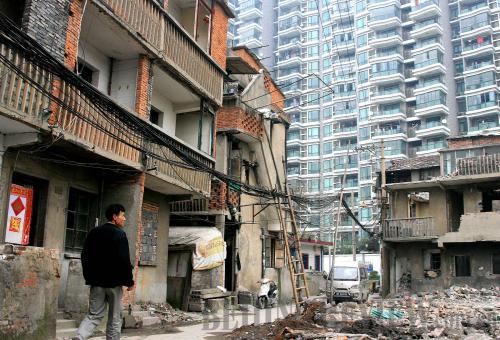|
 |
|
RENEWING COMMUNITIES: A man passes a residential area on Shanghai's Changning Street. In the early 1990s, the Shanghai Municipal Government began a large reconstruction project to replace dangerous antiquated houses with new apartment buildings (CHEN FEI) |
Television audiences around the country were shocked on November 21, 2009, when national broadcaster China Central Television showed clips of two families violently fighting law-enforcement officials who were evicting them from their homes.
The first incident being broadcast happened in June 2008, when Pan Rong and her husband stood on the roof of their four-story house to confront a demolition crew that consisted of police officers, firefighters and a bulldozer. Their family home stood in the way of a Shanghai Hongqiao Airport expansion project. Pan shouted into a loudspeaker, "If you don't have a court verdict, you are violating our property rights."
The bulldozer didn't slow down and she threw Molotov cocktails at it, but the flames were extinguished by the firefighters. The bulldozer knocked down the walls, forcing the couple to flee the house.
In the second clip, in southwestern Sichuan Province, Tang Fuzhen and a dozen relatives fought a demolition crew with rocks, bricks and Molotov cocktails. When officials won the battle and broke into her house after a three-hour confrontation, the 47-year-old woman poured petrol over her head and set herself on fire on the roof of her house. Tang's body turned into a fireball on camera.
Despite their desperate protests, neither Pan nor Tang successfully protected their homes from demolition. Pan's house was demolished immediately after the confrontation and her husband was sentenced to eight months' imprisonment for disrupting public services in April 2009. On November 29, 2009, 16 days after Tang's self-immolation, she died of her injuries in hospital. In both cases, the local governments insisted that the forced demolitions were legal.
But the Regulation on the Dismantlement of Urban Houses, which authorizes forced demolitions if homeowners fail to move out within the time required by government verdict, has been criticized as outliving its relevancy. On December 16, 2009, after a four-hour closed-door meeting to discuss a replacement regulation, Gao Fengtao, Deputy Director of the Legislative Affairs Office of the State Council, said the 2001 regulation should have been abolished as it runs against China's Property Law, which took effect in October 2007. Scholars participating in the meeting said they would soon seek public opinions on the new draft.
"The dismantlement of homes in cities practically has no law to regulate it," Gao told The Beijing News newspaper.
Old regulation
Homeowners cite Article 66 of the Property Law for their right to defend their houses, while authorities wield the Regulation on the Dismantlement of Urban Houses during confrontations over clearing land for new building projects. Article 66 says, "The legitimate properties of individuals shall be protected by law and shall not be occupied and damaged by any institution and individual."
Although the Standing Committee of the National People's Congress (NPC), China's top legislature, authorized the State Council to revise the existing regulation as early as August 2007, the drafting process has taken much longer than many had expected.
Qiao Zhanxiang, a lawyer representing homeowners in numerous demolition lawsuits, told newspaper China Times that inefficiency on the part of the government should take the blame. But an unidentified official with the State Council's Legislative Affairs Office told the newspaper that the office was taking a prudent approach in drafting the regulation since it concerns people's livelihood.
The legislative procedures may accelerate after an open letter from five Peking University law professors to the Standing Committee of the NPC that said the current demolition regulation is unconstitutional and violates the Property Law.
The letter, reported by several newspapers on December 8, 2009, said housing owners should receive compensation during expropriation instead of after demolition and that no demolition permit should be granted if housing expropriation has not been completed. On December 14, the five professors received an invitation to voice their opinions at a legal experts' discussion on the draft regulation on December 16.
Core changes
Article 42 of the Property Law says, "For public interest, collectively owned land, houses and other real property owned by institutes or individuals may be expropriated in line with the procedure and within the authority provided by laws."
Scholars participating in the meeting said they discussed six core issues, including the definition of public interest, procedures for deciding on housing expropriation, compensation standards, a dispute settlement mechanism, forms and procedures of forced eviction and compensation standards for land seizure that is not in the public interest.
According to Xinhua, experts agree that government should be the only qualified housing expropriator. Under the existing Regulation on the Dismantlement of Urban Houses, Xinhua said, the government only undertakes the responsibility of supervision during housing demolition while enforcement often falls on property developers.
Professor Jiang Ming'an, one of the open letter's authors, told Xinhua after participating in the meeting that "all of our three key suggestions have been adopted, which will greatly ease the current tension between government-authorized demolition crews and homeowners."
| 